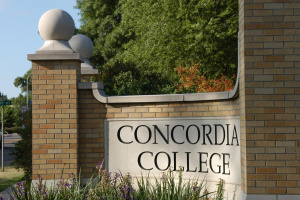Neurochemistry
Neurochemistry has been by far the most engaging class I have taken at Concordia. We were challenged to address complicated diseases affecting the central nervous system. Instead of a traditional lecture-based classroom we were motivated to learn at our own pace and given the option to really control the path of the course. Rooted in the complex biochemical basis of many different cellular signaling pathways we connected our knowledge all the way to past and current social issues which separate the country today. By creating a strong foundation for our conversations, we were able to engage in constructive dialogue on complex topics and then repeat the process again the next week.

Concordia is a liberal arts school with the goal of graduating students who have ambitions to be responsibly engaged in the world. Neurochem is a perfect embodiment of this mission. I used knowledge gained in chemistry courses to connect with the biology of cellular signaling. Expanding upon the science we are able to connect to the social dilemmas we learn about in other courses. Using communication taught in intro courses a responsible conversation is at hand.
Real World Example
A perfect example of a discussion in our class that relates is around obesity. Perhaps in uneducated response is simply “It is their fault; people need to eat better and work out more.” However, we are learning that in most cases of obesity there has been a disruption in our brain signaling and how people feel hunger is different than their healthy counterpart. We also need to dive into the social constructs of society that force the lower class and less fortunate to eat unhealthy food and find a solution. We need to weigh the mental health benefits of positive body image with the messages of healthy living and exercise, as mental and physical health are correlational. Then we need to look outside the United States and see how obesity affects other nations and cultures. An issue that can seem so simple can be very complex and diverse.
That is the advantage of a liberal arts education, becoming a well-rounded individual prepared to face some of life’s most difficult tasks. As our planet’s problems become more complex and more important it is necessary to be educated in different fields to create a deeper understanding.
Connecting to my future, this class and many others will allow for a well-rounded approach to problems in my personal and professional life. This course and others at Concordia have taught me to face problems with a multifaceted approach. First understanding the science, then the social innuendos, and finally looking at things from all perspectives is a well-rounded way to make decisions.
